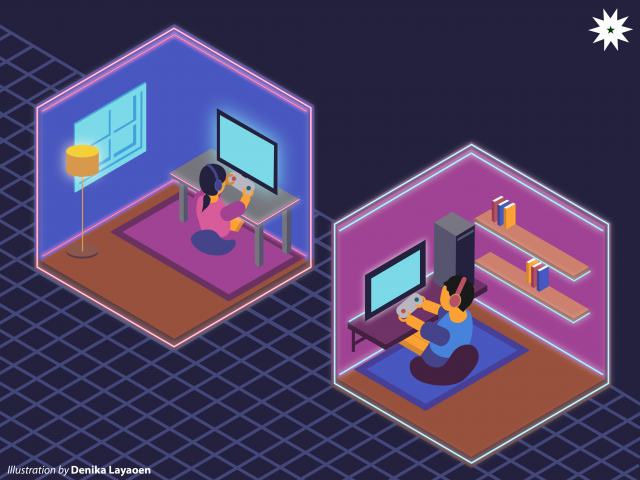The world seemed to be put into a standstill as it started to experience the brunt of the COVID-19 pandemic. Businesses were closed until further notice, public events were canceled or postponed, and everyone’s movements were limited due to community quarantine policies. At home, we seek different activities to keep ourselves anchored and to maintain a sense of calm.
Of these pursuits, one organic response—at least for those with access—has been to turn to various forms of games.
Titles released during this period, such as Animal Crossing: New Horizons, a social simulator on the Nintendo Switch wherein player-characters inhabit an island, and Doom Eternal, a gory first-person shooter (FPS), saw increased sales. Even chess, the classic board game, gained a recent surge of popularity online, with some calling it the “new chess boom”. Online official tournaments played by top players of the sport, along with the amount of registered users and games played in chess servers, have grown in number.
Worldwide, it seems that both competitive and casual gamers alike have been engaging with more gaming content since the beginning of stay-at-home measures.
Calling on new allies
While gaming in itself may be generalized as single player games that disconnect people from others in the real world, some of the most popular and competitive games such as the Counter-Strike franchise, Fortnite, Mobile Legends: Bang Bang, and League of Legends are multiplayer in nature. It has been commonplace to see gamers communicate over voice calls through apps like Discord, cooperating in real-time to plan the next move or to notify teammates about the enemy’s position.
Whether it’s filling a roster full of friends or being matched up with unfamiliar allies, players are tasked to collaborate with each other throughout the duration of the game. For some, these connections are expanded even beyond that one match. As the quarantine measures limit face-to-face interaction, multiplayer games can provide a form of social interaction; they can create new bonds or deepen existing ones by playing the game, further transcending outside the realm of the virtual program itself.
Nicolo Dionisio, a second year Information Technology student from Mapúa University Makati and a veteran FPS player, shares how many of his friends today were made through online gaming and continue to be good friends of his. The quarantine period “deepened the bond” with his old friends from high school, he explains, as they have been reminiscing their past experiences throughout gaming sessions.
For Dan*, a recent graduate of Ateneo de Manila University, the relationships he forms with fellow gamers online, such as through playing Dota 2, are built around this notion of “I got your back and you got mine”, even if they may not necessarily know each other personally.

Additionally, there are gaming forums and communities welcoming new players into the gaming scene as diverse people gather online to share their common interests. Internet personalities such as GMHikaru and xQcOW also interact with fans and fellow gamers through popular streaming platforms like Twitch and now Facebook Gaming. They continue to expand their fanbase with followers who may not necessarily be playing the same games, but are still capable of making connections through their shared appreciation for them.
Nicolo is hopeful that more and more people will be involved in the gaming community after having “experienced gaming [in] one way or another,” as he puts it. The push for a bigger local esports scene does not only fall on grand events like the Electronic Sports and Gaming Summit—considered to be the biggest gaming convention nationwide—but also on small online communities such as the recently organized Taft Gaming Community, a predominantly student-led gaming group. These provide opportunities for both aspiring esports players and newcomers to hone their skills beyond their current level, as well as serve as an avenue for interacting with other people who have similar interests.
To rise and move forward
As gaming has helped “ease [his] tension or anxiety” over the pandemic situation, Dan notes how the “dreamy” and “immersive worlds” of video games can act as an avenue for escape, representing a kind of coping mechanism. He further expresses, “Games can be beautiful pieces of art with various themes, characters, worlds, and stories to tell.”
Despite this, gaming could become a diversion that masks one’s view of the world. As Dan reflects, “I do have to wonder sometimes whether I’m going overboard and escaping the reality out there when there might be something I can do about it.” He therefore stresses the importance of making a difference through this means, noting that “some Twitch streamers have used their gaming streams to gather donations for [hospitals].”
For Dan, perhaps one of the most engaging aspects of gaming, be it with friends or strangers, lies in this: “There is a sense of getting through a sort of hurdle together and forming fun memories that you’ve achieved working together.”
*Names with asterisks (*) are pseudonyms.
